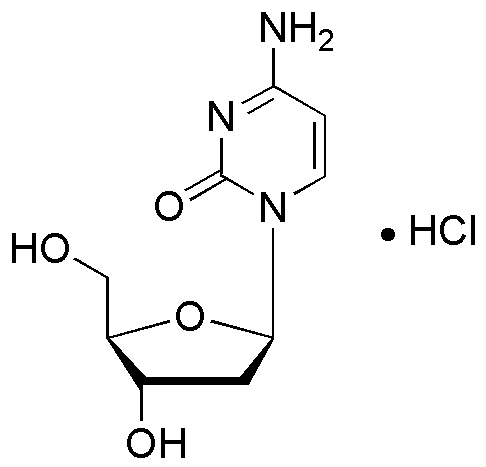2'-Deoxycytidine hydrochloride is widely utilized in research focused on:
- DNA Synthesis: This compound serves as a building block in the synthesis of DNA, making it essential for genetic research and biotechnology applications.
- Antiviral Research: It is used in studies aimed at developing antiviral therapies, particularly for viral infections like HIV, due to its role in nucleoside analogs.
- Cell Culture: Researchers incorporate it into cell culture media to support the growth of various cell lines, aiding in cancer research and drug development.
- Genetic Engineering: The compound is crucial in CRISPR and other gene-editing technologies, allowing scientists to manipulate genetic material effectively.
- Pharmaceutical Development: It is explored in the formulation of nucleoside-based drugs, providing therapeutic options for various diseases, including cancer.
Información general
Propiedades
Seguridad y normativas
Aplicaciones
2'-Deoxycytidine hydrochloride is widely utilized in research focused on:
- DNA Synthesis: This compound serves as a building block in the synthesis of DNA, making it essential for genetic research and biotechnology applications.
- Antiviral Research: It is used in studies aimed at developing antiviral therapies, particularly for viral infections like HIV, due to its role in nucleoside analogs.
- Cell Culture: Researchers incorporate it into cell culture media to support the growth of various cell lines, aiding in cancer research and drug development.
- Genetic Engineering: The compound is crucial in CRISPR and other gene-editing technologies, allowing scientists to manipulate genetic material effectively.
- Pharmaceutical Development: It is explored in the formulation of nucleoside-based drugs, providing therapeutic options for various diseases, including cancer.
Documentos
Hojas de datos de seguridad (HDS)
La SDS proporciona información de seguridad completa sobre la manipulación, el almacenamiento y la eliminación del producto.
Especificación del producto (PS)
La PS proporciona un desglose completo de las propiedades del producto, incluida la composición química, el estado físico, la pureza y los requisitos de almacenamiento. También detalla los rangos de calidad aceptables y las aplicaciones previstas del producto.
Certificados de análisis (COA)
Busque certificados de análisis (COA) ingresando el número de lote del producto. Los números de lote y de partida se pueden encontrar en la etiqueta de un producto después de las palabras "Lote" o "Lote".
Número de catálogo
Número de lote/lote
Certificados de origen (COO)
Este certificado de origen confirma el país en el que se fabricó el producto y también detalla los materiales y componentes utilizados en él y si se deriva de fuentes naturales, sintéticas u otras fuentes específicas. Este certificado puede ser necesario para cumplir con las normativas aduaneras, comerciales y regulatorias.
Número de catálogo
Número de lote/lote
Hojas de datos de seguridad (HDS)
La SDS proporciona información de seguridad completa sobre la manipulación, el almacenamiento y la eliminación del producto.
DownloadEspecificación del producto (PS)
La PS proporciona un desglose completo de las propiedades del producto, incluida la composición química, el estado físico, la pureza y los requisitos de almacenamiento. También detalla los rangos de calidad aceptables y las aplicaciones previstas del producto.
DownloadCertificados de análisis (COA)
Busque certificados de análisis (COA) ingresando el número de lote del producto. Los números de lote y de partida se pueden encontrar en la etiqueta de un producto después de las palabras "Lote" o "Lote".
Número de catálogo
Número de lote/lote
Certificados de origen (COO)
Este certificado de origen confirma el país en el que se fabricó el producto y también detalla los materiales y componentes utilizados en él y si se deriva de fuentes naturales, sintéticas u otras fuentes específicas. Este certificado puede ser necesario para cumplir con las normativas aduaneras, comerciales y regulatorias.


